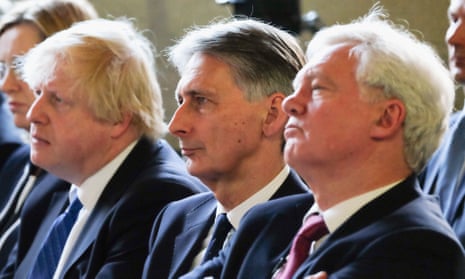Philip Hammond has taken a swipe at Boris Johnson and appeared at odds with David Davis over a post-Brexit transitional deal, in fresh evidence of tensions between cabinet colleagues.
The chancellor warned in a speech in Berlin that negotiations would be jeopardised if parties allowed “petty politics to interfere with economic logic”.
Reiterating warnings about a possible “cliff edge” of tariffs, Hammond urged the government to negotiate an early transitional arrangement that “allows the complex supply chains and business relationships that crisscross our continent to continue to deliver value”.
However, later on Tuesday afternoon, Davis, the Brexit secretary, insisted in a separate event in London that the UK would be fully outside of the customs union and single market by March 2019.
Downing Street sought to play down any differences between the two, saying both were “on the same page” about the need for an implementation period after the two-year article 50 timetable for EU withdrawal has elapsed.
Burnishing his role as the cabinet’s most vocal advocate of a softer departure from the EU, Hammond also took a barely disguised jab at Johnson, the foreign secretary.
The chancellor alluded to Johnson’s pronouncement that “my policy on cake is pro having it and pro eating it”, by quoting Germany’s postwar chancellor Ludwig Erhard’s line, “a compromise is the art of dividing a cake in such a way that everyone believes he has the biggest piece”.
He added: “Wise words with some applicability to the Brexit negotiations, although I try to discourage talk of ‘cake’ amongst my colleagues.”
Emphasising the point at the end of the speech, Hammond said the purpose of the Brexit negotiations should be “an outcome [where] we can be smart enough to work out how to continue collaborating together, to keep the cake expanding, for the benefit of all”.
Hammond’s outspoken comments underscore the chancellor’s revived position in the cabinet, having widely been expected to be moved aside had Theresa May won a convincing majority in June.
Brexit phrasebook: cliff edge
The consequence of leaving the EU, its single market and customs union without a future trade deal lined up. This could mean big tariffs on some UK exports, British goods no longer accredited for sale on the continent, planes grounded, lengthy customs checks at ports and administrative and legal chaos. See our full Brexit phrasebook.
Davis told company executives at an event hosted by the Times that exit talks would be concluded by the two-year deadline. Asked if the UK would be straight out of the customs union, he replied: “I would have thought so.”
The Brexit secretary said any transition period was likely to end in 2022, as he described Hammond’s previous comments on the potential timescale as “not quite consistent with one another”.
He went on: “What he’s actually said, the most important thing is it’s got to be done before the election so that’s a maximum of three years.”
In his speech at the summit, Davis said he agreed with the chancellor on prioritising jobs and the economy. “I firmly believe that our approach puts jobs and prosperity first. So much so I didn’t even think it was necessary to say it at the beginning,” he said.
The Brexit secretary said he and Hammond were “entirely aligned” on the need for a transition. “It is an approach the chancellor and I have designed over some months at the meetings we have every week to develop our strategy in this area,” he said.
Downing Street said May had consistently advocated a smooth transition post-Brexit. “It is not in anyone’s interest for there to be a cliff edge, we want to give certainty to businesses. That’s the position of David Davis and Philip Hammond also,” the prime minister’s spokeswoman said.
Asked if Davis was right to assert that the UK would be leaving the customs union by March 2019, the spokeswoman said the stages of departure would be a matter for negotiations. “Clearly, leaving the EU means leaving the customs union,” she said.
“What that looks like and phases of implementation is all subject to negotiation. We will need a period of implementation as we move towards new trading arrangements, what that looks like, when it starts, when it ends is all a subject for negotiations.”
Downing Street also refused to back Davis’s assertion that the UK must complete its transitional arrangements by 2022, the time of the next general election. “That is a matter for negotiations, which have just begun,” the spokeswoman said.
